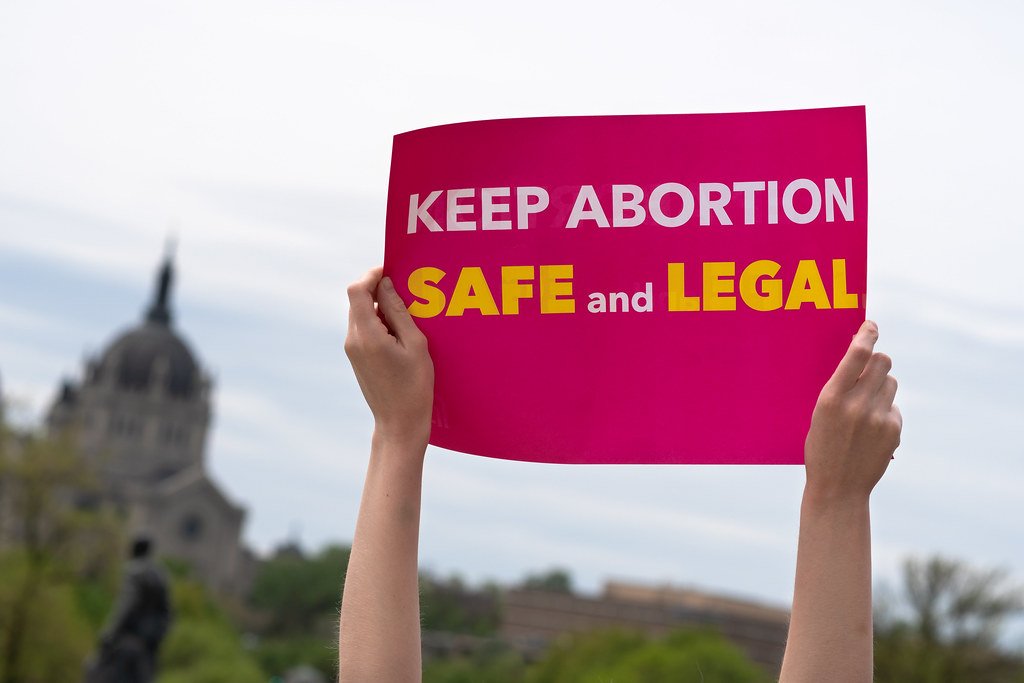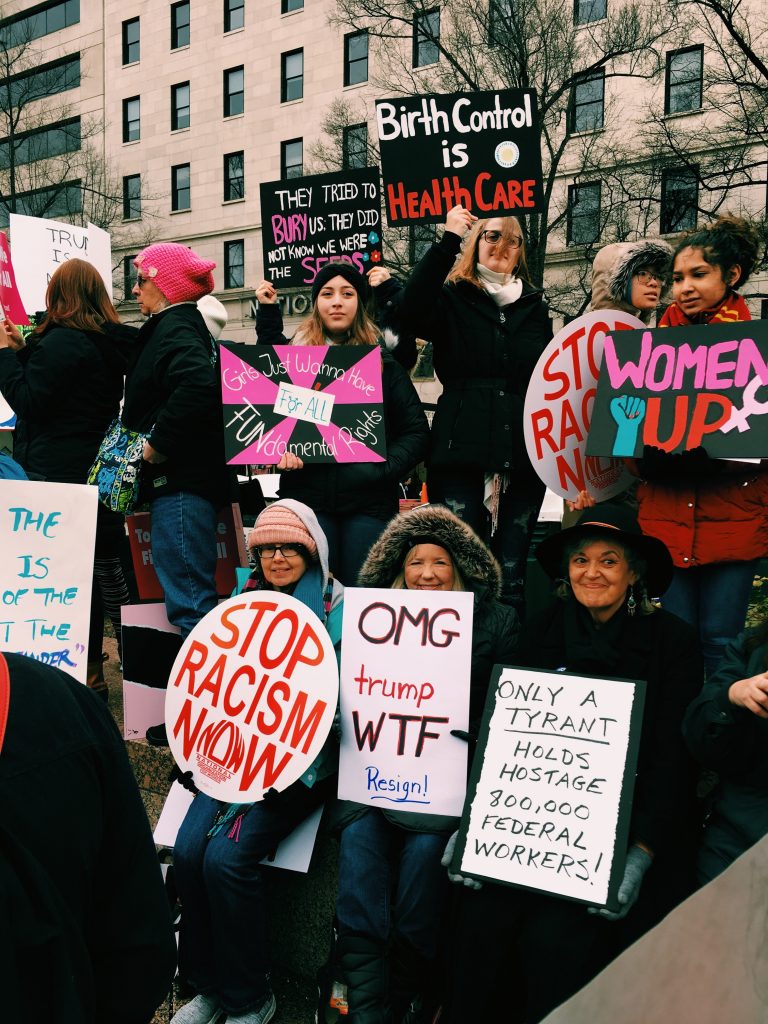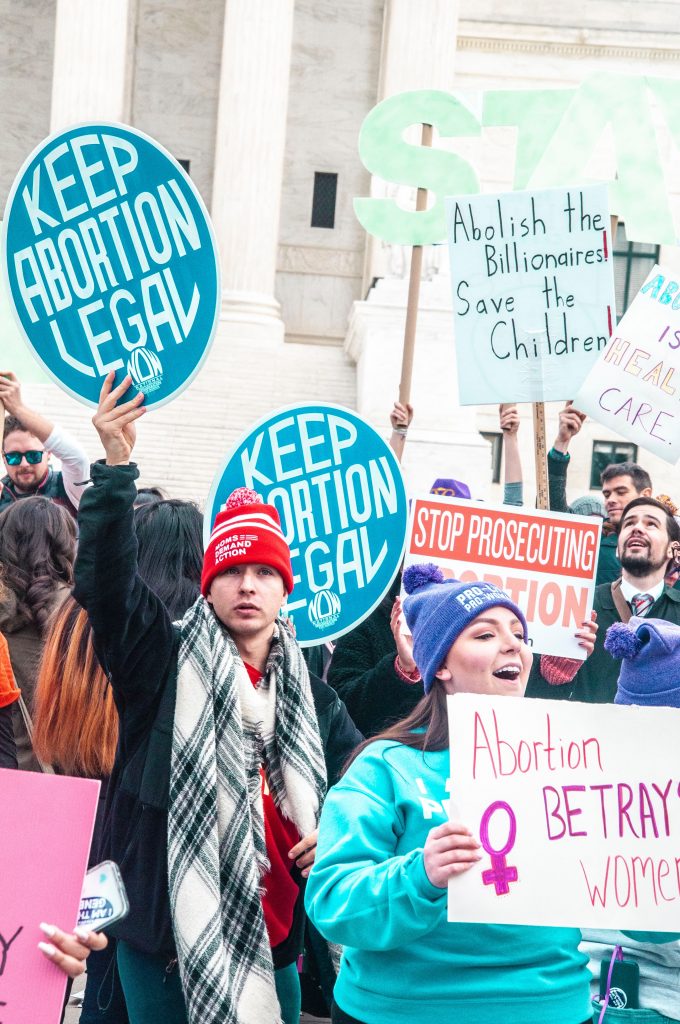Planned Parenthood v. Abbott (2020) highlights the lengths courts will go to protect anti-choice politicians. During the COVID-19 pandemic, this allyship is even more dangerous for vulnerable populations and threatens the future of abortion access.
By: Morgan Moone, Associate Editor
On March 13, 2020, President Trump declared the COVID-19 pandemic a national emergency. Swiftly, state-led efforts to restrict abortion during this time began coming to light as “emergency declarations” posed to prevent the spread of COVID-19.
Global emergencies, including the one we are living through, create chaos in societies. And that chaos and uncertainty highlight the glaring deficiencies in our country as a profits-over-people system screeches to a halt.
People already have enough to deal with. A pandemic is not the time to restrict bodily autonomy. Restricted access to abortion already creates emergencies in “normal” times. Time and time again, studies have shown that people who are denied access to abortion are more likely to face social and economic consequences.
“Existing racial and economic disparities in abortion access are going to be exacerbated as people lose their jobs and childcare and it becomes more for difficult to access health care and travel. ….Rather than using the pandemic as a way to grab power, states should be looking for ways to both safeguard public health and ensure access to essential services,” Cynthia Soohoo, a professor at CUNY Law School, told Law At the Margins. “For instance, in England the government is putting in place measures to make it easier to obtain medication abortion by facilitating telemedicine. These are the kinds of things we should be doing.”
The uncertainty of our collective futures under COVID-19 already creates an environment of fear. People seeking abortions should not have to also fear inability to access health care. Dr. Ashley Brant, an OB-GYN in Ohio and a fellow with Physicians for Reproductive Health, told Vox: “Many of my patients are experiencing fear … [f]ear of contracting COVID-19, fear of losing their jobs and income, and fear of not being able to support their families. They should not have to fear losing access to reproductive health care, too.”

Cowardly leaders seize crises and stoke panic. Republican leaders insisted on language in the recent stimulus bill to ensure that states and localities couldn’t use stimulus funds to help pay for abortions.This effort showcases the utilization of crises to push for political agendas amidst chaos instead of securing unemployment benefits and funding for expanded health-care services. Constituents of these representatives should not forget that, in a time of crisis, their leaders sought not to protect the citizens of their states, but stonewalled a relief bill until it reflected their own political and religious ideologies.
While leaders in Congress were debating whether funds could go to organizations such as Planned Parenthood, state leaders began chipping away at the core of Roe v. Wade by restricting access to services. Texas, notably, has been at the forefront of the effort, with other states falling quickly in step. “It is clear that abortion is being singled out,” Soohoo said. “Despite the fact that most executive orders allow doctors to determine which procedures are medically necessary, the Texas attorney general singled out and explicitly banned abortions and even prohibited medication abortion when no other oral medication has been prohibited.”
“It is clear that abortion is being singled out. Despite the fact that most executive orders allow doctors to determine which procedures are medically necessary, the Texas Attorney General singled out and explicitly banned abortions and even prohibited medication abortion when no other oral medication has been prohibited.”
Prof. Cynthia Soohoo, CUNY Law School
The greatest threat remains in the Fifth Circuit, whose jurisdiction includes Texas, Mississippi and Louisiana, a notoriously conservative jurisdiction comprising a large part of the Gulf South. The Fifth Circuit Court of Appeals is Trump’s dream and our nightmare. Already traditionally conservative, the Fifth Circuit received a new cohort of politically and socially conservative judges after Trump’s election. For many of us, these judicial appointments went by unnoticed, not because of lack of interest, but because these appointments and hearings rarely make the news. For the most part, appointments are swiftly confirmed with little to no contestation. For some of us, the appointment of Brett Kavanaugh made the rest of the appointments of militantly anti-choice judges seem like an unavoidable condition of a Trump presidency.
With June Medical Services already at the Supreme Court, these restrictions under COVID-19 pose a new threat to health-care access across the nation.
The Fifth Circuit’s Recent Record: June Medical v. Russo and Planned Parenthood v. Abbott
June Medical Services LLC v. Russo (formerly “Gee”), while not the only abortion case out of the Fifth Circuit, was one of the most publicized. In a nutshell, Act 620 requires doctors performing abortions to have admitting privileges to hospitals within 30 miles of where the providers perform abortions. Not only are these admitting privileges wholly unneccessary (no hospital will deny a patient with a life-threatening complication), the restrictions provided in Act 620 are almost identical to restrictions struck down in Whole Woman’s Health v. Hellerstedt in 2016. If June stands, it will close all but one of Louisiana’s health clinics.
The case started in the District Court for the Middle District of Louisiana in 2014, and in 2017 it was decided that Act 620 would “do little or nothing for women’s health,” and declared the restriction unconstitutional. Of course, the state of Louisiana appealed. To the Fifth Circuit.

On Sept. 26, 2018, the Fifth Circuit declared Act 620 constitutional. Center for Reproductive Rights appealed and was denied, landing us at the Supreme Court.
Oral arguments were heard in March 2020 for June, and it should be noted that this restriction would not deem Roe unconstitutional, but would rather provide an avenue for its gutting. Restrictions that impede access to an abortion would effectively nullify Roe without its technical eradication.
June’s restrictions should be deemed unconstitutional because they are identical to the ones in Women’s Health and if the Supreme Court upholds June, it will prove that the outcome of Supreme Court cases are not based on the law itself, but are entirely contingent on who sits on the bench.
The outcome of this case is already concern enough, but with the entrance of COVID-19 and subsequent declarations of emergency sprouting up to “flatten the curve,” some states have gone above and beyond to utilize the pandemic to restrict abortion access.
Take Texas, for example.
On March 24, 2020, Texas Attorney General Ken Paxton, with support from Gov. Greg Abbott, ordered all abortion services immediately halted, labeling them “non-essential,” elective procedures. Those who continued to provide abortions were at risk of up to $1,000 in fines or 180 days of jail time. Essentially, AG Paxton exploited a global crisis to suppress bodily autonomy.
“Patients are already being forced to put their lives in harm’s way during a pandemic, and now will be forced to continue doing so to get the health care they need. Abortion is essential, it’s time-sensitive, and it cannot wait for a pandemic to pass.”
Alexis McGill Johnson, Acting President and CEO of Planned Parenthood Federation of America and the Planned Parenthood Action Fund
On March 26, 2020, the Center for Reproductive Rights, Planned Parenthood and the Lawyering Project filed a complaint, asking for a restraining order to prevent the ban from continuing, essentially pausing its implementation.
The ban on abortion services was briefly lifted the evening of March 30, 2020, when the lower court in Texas ruled that suspending abortions was unconstitutional. Abortion services were temporarily allowed to resume for under 24 hours before the Fifth Circuit Court of Appeals reversed the lower court’s decision. This reversal allowed the abortion ban to go back into effect. It should be noted that Center for Reproductive Rights requested a partial lift of the ban, allowing medication abortion to be permitted. That request was denied.
Despite being a disturbingly odd move by the Fifth Circuit procedurally (more on that here), the Fifth Circuit has allied itself with anti-choice politicians and provided a direct avenue for this case to head to the Supreme Court, with the question of whether emergency powers allow infringement on the right to abortion. Judge James L. Dennis, the only judge in favor of lifting the ban, noted the Fifth Circuit’s “recurring phenomenon … in which the result follows not because of the law or facts, but because of the subject matter.”
On April 11, 2020, Texas’ Emergency Declaration appeared before the Supreme Court, with Planned Parenthood seeking an emergency restraining order. As of this writing, there is no movement on the request.
Two Fifth Circuit Cases, COVID and the Future
Already strained under social distancing requirements, health-care clincis are feeling even more pressure now that their funding from the CARES Act stimulus package may be denied. Under the law, President Trump’s Small Business Administration may deny funding to Planned Parenthood, and the final law also includes language that potentially prevents states and local governments from using COVID-19 funds to help abortion services. And with the never-ending launch of emergency declarations declaring abortion a nonessential procedure, clinics and reproductive justice organizations are fighting ceaselessly to ensure that their services remain available to those who need them.
“When you layer this restriction of necessary health care on top of the public’s concerns about the unknown of their future well being it is just really beyond tragic. It was devastating.”
Dr Robin Wallace, co-medical director at Southwestern Women’s Surgery Center
On April 10, 2020, just days after the Fifth Circuit’s dance with Texas’ Emergency Declaration, Mississippi enacted its own. And it is admittedly modeled after Texas’, highlighting just how dangerous emergency declarations can be, and how incredibly powerful appointed judges are in shaping anti-choice legislation and policy. Mississippi copy and pasted Texas’ declaration and conformed it to their state laws because the court said it was OK. The procedural hula-hoops that the Fifth Circuit did to allow this ban to stay in effect is astounding. Abortion access is at risk, and it’s because of judges and circuits like the Fifth that give power to anti-choice politicians. And judges and circuits like the Fifth are birthed through appointments by presidents like Trump.
In addition to the risk of other states enacting similar emergency declarations, we must also think of access to abortion long-term.
Abortions are already hard to get, and these restrictions are concerning limitations not just for the present, but for the future of reproductive health-care access. Brett Kavanaugh vowed his stance against abortion prior to his appointment, and the appointment itself by Trump indicates his strategic placement on the bench. During June’s hearing in March, both Justices John Roberts and Kavanaugh’s questions “suggested that the idea of overturning precedent and how broadly it applies will be the determining factor in the court’s decision.”
If/When/How legal and policy director Sara L. Ainsworth, when asked how the current climate might impact abortion access, said: “What is exceedingly clear is that anti-abortion politicians and courts, convinced that the constitutional protections for reproductive rights cannot hinder their activism, are bent on exploiting every opportunity — even a global pandemic — to stop people from self-determining their reproductive lives. The problem is that demonizing abortion, and the people who have abortions, has never stopped people from ending their pregnancies. Rather, this builds abortion stigma, which — as we wrote in our amicus brief in June Medical — in turn increases the risk of criminalization for people who self-manage their abortions.”
With June’s ruling still to be given, it’s uncertain whether the potential addition of another Fifth Circuit reproductive rights case would create a mess, or provide an opportunity to reinforce Roe’s clout.
Either way, we have a huge fight coming, and in the middle of a pandemic, no less.
* Update: Planned Parenthood withdrew their request for Supreme Court review, 4/14/20. Medication abortions are permitted in Texas during COVID-19 while litigation on the near total abortion ban continues






